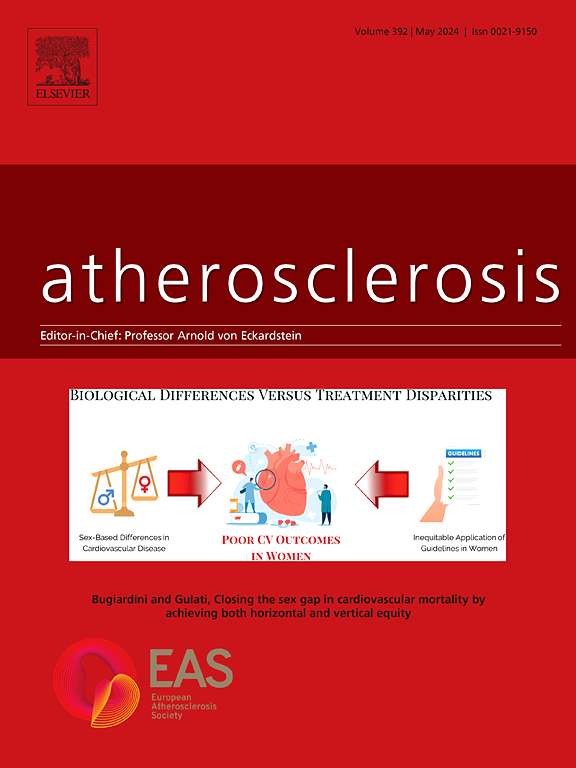Efficacy and safety of ongericimab in Chinese statin-intolerant patients with primary hypercholesterolemia or mixed dyslipidemia: a randomized, placebo-controlled phase 3 trial
IF 4.9
2区 医学
Q1 CARDIAC & CARDIOVASCULAR SYSTEMS
引用次数: 0
Abstract
Background and aims
Several protein convertase subtilisin/kexin type 9 (PCSK9) inhibitors have been shown to significantly reduce low-density lipoprotein cholesterol (LDL-C) levels in statin-intolerant patients, but none have been verified in Chinese patients. This study aimed to evaluate the efficacy and safety of ongericimab, a novel PCSK9 monoclonal antibody, in Chinese statin-intolerant patients with primary hypercholesterolemia or mixed dyslipidemia.
Methods
This was a randomized, multicenter, double-blind, placebo-controlled phase 3 study designed to enroll 120 statin-intolerant adult patients. Eligible patients were randomly assigned in a 2:1 ratio to receive ongericimab 150 mg or placebo subcutaneously every 2 weeks for 12 weeks in the double-blind treatment period, followed by 40 weeks of ongericimab treatment during the open-label period. The primary endpoint was a percentage change in LDL-C from baseline to week 12. The key secondary endpoints included percentage change from baseline to week 12 in non-high density lipoprotein cholesterol (non-HDL-C), apolipoprotein B (ApoB), total cholesterol (TC), and lipoprotein(a) [Lp(a)].
Results
From February 6, 2023, to September 23, 2024, a total of 139 patients were enrolled. The least-squares (LS) mean difference between ongericimab and placebo groups in LDL-C from baseline to week 12 was −66.2 % (95 % CI: 74.2 %, −58.2 %; p < 0.0001), with reductions sustained up to week 52. Ongericimab also significantly reduced levels of non-HDL-C, ApoB, TC, and Lp(a). The overall incidence of treatment-emergent adverse events was comparable between the ongericimab and placebo groups.
Conclusion
Ongericimab significantly reduced LDL-C as well as other atherogenic lipid levels and was well tolerated in Chinese statin-intolerant patients with primary hypercholesterolemia or mixed dyslipidemia.
Clinical trial registration
http://www.clinicaltrials.gov; Unique Identifier: NCT05621070.
昂格瑞单抗治疗中国原发性高胆固醇血症或混合性血脂异常的他汀不耐受患者的疗效和安全性:一项随机、安慰剂对照的3期试验
背景和目的几种蛋白转化酶枯草杆菌素/凯斯汀9型(PCSK9)抑制剂已被证明可显著降低他汀类药物不耐受患者的低密度脂蛋白胆固醇(LDL-C)水平,但尚未在中国患者中得到证实。本研究旨在评价新型PCSK9单克隆抗体ongericimab在中国原发性高胆固醇血症或混合性血脂异常的他汀不耐受患者中的疗效和安全性。方法:这是一项随机、多中心、双盲、安慰剂对照的3期研究,设计入组120例他汀类药物不耐受的成年患者。符合条件的患者以2:1的比例随机分配,在双盲治疗期间每2周皮下注射150 mg昂格昔单抗或安慰剂,持续12周,然后在开放标签期间接受40周的昂格昔单抗治疗。主要终点是LDL-C从基线到第12周的百分比变化。关键次要终点包括从基线到第12周的非高密度脂蛋白胆固醇(non-HDL-C)、载脂蛋白B (ApoB)、总胆固醇(TC)和脂蛋白(a) [Lp(a)]的百分比变化。结果2023年2月6日至2024年9月23日,共入组139例患者。从基线到第12周,昂格昔单抗组和安慰剂组LDL-C的最小二乘(LS)平均差异为- 66.2% (95% CI: 74.2%, - 58.2%;p & lt;0.0001),下降持续到第52周。昂格瑞单抗也显著降低了非hdl - c、ApoB、TC和Lp的水平(a)。治疗后出现的不良事件的总发生率在昂格昔单抗组和安慰剂组之间是相当的。结论:在中国原发性高胆固醇血症或混合性血脂异常的他汀不耐受患者中,奥吉瑞单抗可显著降低LDL-C及其他致动脉粥样硬化性脂质水平,耐受性良好。临床试验注册:http://www.clinicaltrials.gov;唯一标识符:NCT05621070。
本文章由计算机程序翻译,如有差异,请以英文原文为准。
求助全文
约1分钟内获得全文
求助全文
来源期刊

Atherosclerosis
医学-外周血管病
CiteScore
9.80
自引率
3.80%
发文量
1269
审稿时长
36 days
期刊介绍:
Atherosclerosis has an open access mirror journal Atherosclerosis: X, sharing the same aims and scope, editorial team, submission system and rigorous peer review.
Atherosclerosis brings together, from all sources, papers concerned with investigation on atherosclerosis, its risk factors and clinical manifestations. Atherosclerosis covers basic and translational, clinical and population research approaches to arterial and vascular biology and disease, as well as their risk factors including: disturbances of lipid and lipoprotein metabolism, diabetes and hypertension, thrombosis, and inflammation. The Editors are interested in original or review papers dealing with the pathogenesis, environmental, genetic and epigenetic basis, diagnosis or treatment of atherosclerosis and related diseases as well as their risk factors.
 求助内容:
求助内容: 应助结果提醒方式:
应助结果提醒方式:


